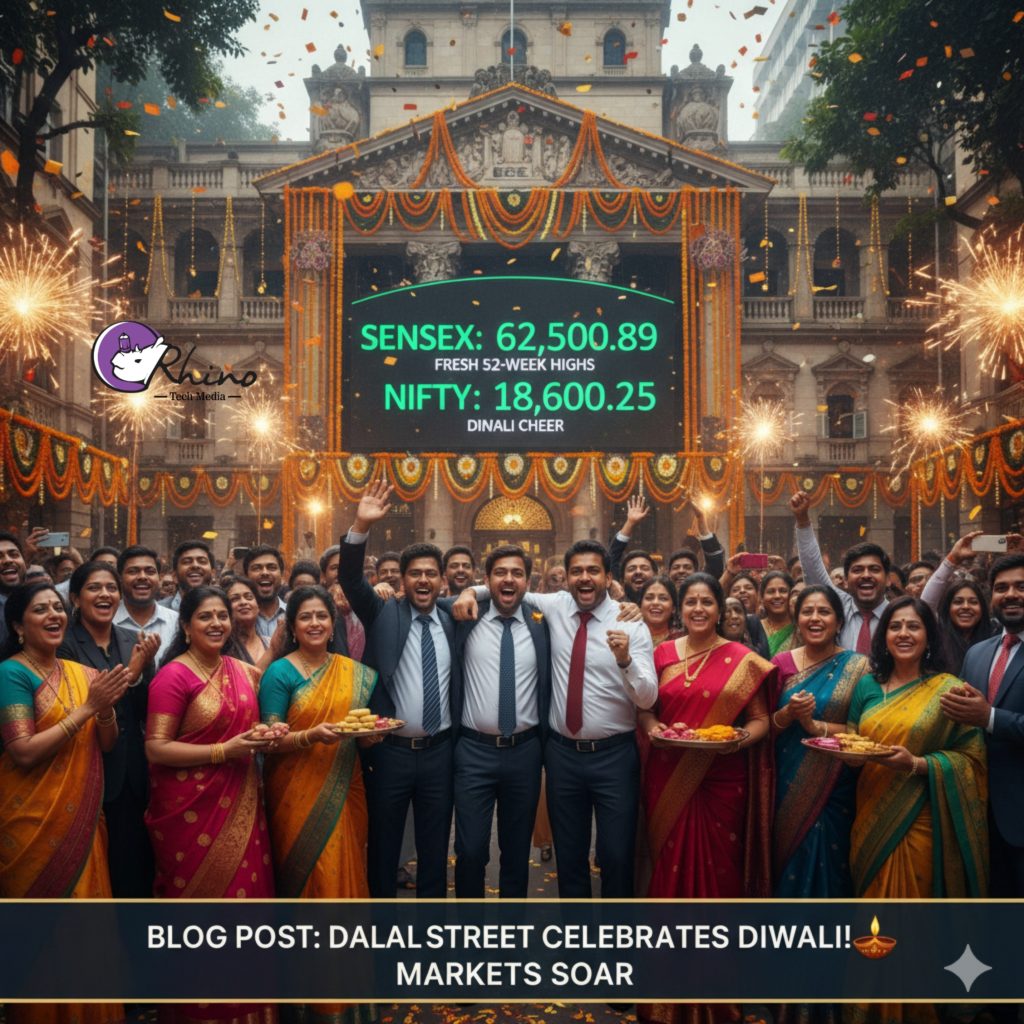Diwali Cheer on Dalal Street: “Samvat 2082” Opens with a Spark for Markets
As the Indian equity markets lit up in the festival of lights, it was not just diyas and fireworks that brightened the mood—Sensex and Nifty 50 on “Dalal Street” delivered their own bursts of brightness. On the eve of Diwali and the start of the new Hindu calendar year (Samvat 2082), both benchmark indices advanced to fresh 52-week highs, signalling robust investor sentiment and a shift in the market’s tone.
This essay will chart the key drivers behind the move, assess the dynamics at play, and offer a cautiously optimistic outlook for the months ahead.
1. The Magnitude of the Move
In recent sessions leading into Diwali, the Nifty 50 breached its 52-week high, closing at approximately 25,843 (up ~133 points or ~0.5 %) while the Sensex rose about 411 points (~0.5 %) to close around 84,363. The intraday tendency was even stronger, with Nifty hitting intraday highs near 25,926.2.
Over a slightly broader timeframe, the Sensex climbed nearly 1,900 points in just three days, underscoring the speed of the up-move.
In simple terms: it wasn’t a modest uptick. The rally signalled renewed confidence in the Indian equity story.
2. Key Drivers behind the Festive Rally
Several interlocking factors have underpinned the rise—both domestic and global:
- Corporate Earnings & Recovery Signs: Early earnings disclosures showed that the long streak of earnings downgrades may be ending. According to one report, “the cycle of earnings downgrades … is nearing its end.” Banks and IT firms in particular were strong performers. For instance, private-sector banks helped lead the rally in the Nifty.
- Sector Rotation & Breadth: The rally was not limited to one or two sectors. Broad-based buying emerged—most sectoral indices posted gains. Notably, PSU banks, Oil & Gas, and IT were among the leaders.
- Foreign and Domestic Institutional Flows: Renewed foreign institutional investor interest, coupled with continued domestic buying, added momentum. One piece pointed to FPIs turning net buyers in recent sessions.
- Global Macro / Risk Sentiment: Easing global risk, hopes of U.S. rate-cuts, better India-U.S. trade views, and a stronger rupee all contributed to improved sentiment.
- Technical / Calendar Tailwinds: The festival week and the “Muhurat” trading session ahead added a psychological boost. Markets often look for an auspicious start to a new calendar year.
3. Why the Timing Matters
The rally’s timing is meaningful:
- It aligns with the start of Samvat 2082 (the new year in the Hindu lunisolar calendar), a period often associated with fresh beginnings.
- The upcoming “Muhurat trade” session (special one-hour trading during Diwali) tends to bring symbolic significance and occasional market bursts.
- Markets had been under a bit of pressure in recent quarters (modest returns), so this upward momentum provides relief and potentially signals a transition phase. For example, analysts suggest 10-15 % returns may be feasible in the year ahead.
4. Risks and the Caveats
While the mood is upbeat, several cautionary flags are waving:
- Valuation Stretch: The indices are already close to previous all-time highs. For example, Nifty is within ~1.4 % of its record high. When valuations get elevated, upside becomes harder to sustain without strong follow-through.
- Earnings Still Recovering: Although the cycle is turning, the recovery is not yet uniform or robust across all sectors. Continued earnings growth will be vital.
- Global Spillovers: External shocks (geopolitical, inflation surprises, U.S. Federal Reserve decisions) could dampen enthusiasm. The market’s positive tone partly reflects improved global cues, so any reversal could weigh.
- Technical Consolidation Risk: Given the rapid advance, some consolidation or pullback is plausible before a fresh leg up. Analysts have flagged this.
5. What Lies Ahead: Outlook for Investors
Given the above, here is how one might frame the near-to-mid-term outlook for Indian equities:
- On the positive side, the structural backdrop remains favourable: India’s economic growth remains relatively strong, corporate earnings are stabilising, and liquidity remains ample. The festival-driven sentiment boost could provide a catalyst for further gains.
- Analysts cited 10-15 % potential upside in the year ahead (Samvat 2082) if the recovery broadens and institutional flows continue.
- From a technical vantage, support levels are emerging. For the Nifty, immediate support lies around 25,650 and 25,450; upside resistance in the near term may be around 26,000 or slightly above.
- A prudent strategy: Investors could consider “buy-on-dips” rather than chasing frothy valuations. Ensuring portfolio diversity and monitoring key earnings announcements will be important.
- Given the risks, investors should keep an eye on global developments (Fed policy, China-U.S. trade, commodity prices) as well as domestic triggers (corporate earnings, inflation/interest rate policy, and capital flows).
6. Concluding Thoughts
The taste of Diwali has evidently spilled over into Dalal Street—festive optimism, renewed corporate confidence and improved global risk sentiment have all conspired to lift the Sensex and Nifty to fresh 52-week highs. It’s a meaningful moment: a turn of year, a reversal of recent caution, and a runway for potential upside.
However, the rally is best viewed with measured enthusiasm rather than unchecked exuberance. The market has come a long way, and the next leg of gains will require consistent execution — by corporates, by policymakers, and by macro stability. If those align, investors could well look back at Samvat 2082 as a strong chapter. If they falter, the recent high could instead become a plateau.

